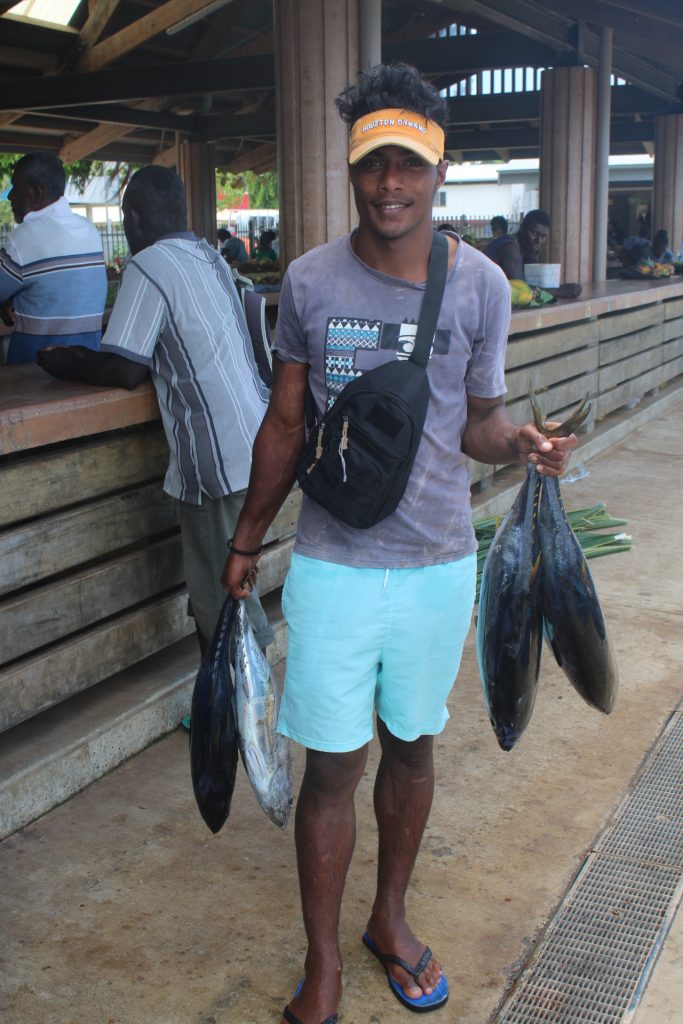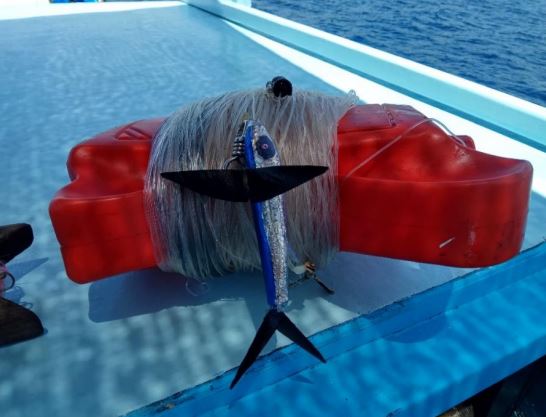2 November 2021 | TUNA PACIFIC
 |
| Schulte Maetoloa, the owner of Gizo Smoked Tuna - a new smoked fish business in Gizo, Western province. |
HONIARA, Solomon Islands – In Solomon Islands, a new business in the tuna Industry is emerging with the start up of an initiative to provide local filleted smoked fish.
The man behind the business is Schulte Maetoloa, a well-known singer and songwriter from Malaita province who now lives in Gizo, in Western Province. Popularly known by his artist name of Solid-T, Mr Maetoloa has been slowly moving away from his music career over the past few years to focus on other family obligations.
His recent undertaking is to venture into the commercial world with Gizo Smoked Tuna.
Mr Maetoloa said the idea behind selling smoked fish was simply to promote a very well-known commodity of the country, especially yellowfin tuna, and place more value on it.
His close relations with numerous fishers in the western region of Solomon Islands has given him an above-average insight into the plight of rural fishers and the painstaking daily rituals they endure to make a simple living.
Mr Maetoloa said the smoked fish had proven to be profitable since it was introduced early this year.
“I began to sell the product to my friends at first, before distributing it to other busineses in Gizo,” Mr Maetoloa said.
“They were satisfied by the taste of the product and how it was processed. The product has the same quality as all vacuum-package goods.”
Adding value to Solomons tuna and buying from local fishers
Seeing the steady progress of his business idea into fish processed and sealed for sale, Mr Maetoloa described his venture as trying to add value to a Solomon Islands fish commodity.
He had some experience to back the development of his idea: he has experimented with a number of business ventures and gained experience in the country’s national economic culture, and is known among his friends as a visionary leader and a man of action.
The idea to produce and sell smoked fish came about after seeing the plight of local fishers in the Western Province where he lives.
“I had come to realise that our fish market was in danger of becoming saturated, and despite numerous streams of market opportunities for fish and fish products, the capability of rural fishermen to tap into it was easier said than done,” Mr Maetoloa said.
“My previous ventures had allowed me to save a little money, just enough to begin few trials in smoking fish fillets, but even now we are restricted by our capacity to grow and accommodate a national market.”
 |
| Samples of the vacuumed smoked fish products |
Using fresh fish important
Mr Maetoloa proudly explained that the basis of his market is the freshness of his fish stocks, and while this brings with it a number of logistic issues, he has no plan to change that.
“It is important for us to produce our product from freshly caught fish that we receive and processed with the first few hours,” he said
“One obvious reason for this is because fish is a staple food in our country, and it would be greatly obvious to many customers if our smoked fish was made from long-time stored fish stocks.”
The company was looking at assisting fishers with ice cubes and chiller boxes while they are out at sea, so that their catch is placed immediately on ice to retain its freshness.
Mr Maetoloa said people’s familiarity with the taste of fresh fish was a challenge for his business to resolve—and it was also a blessing because sales have assured him that a market for the delicacy is readily available.
Another challenge has been that the company was not able to immediately achieve its goal of selling into a wider market, with the need for larger storage, processing structures and hygienic health standards to be adhered to.
 |
| Staff of Gizo Smoked Tuna display a sample of the new company’s products at a stall on World Tuna Day in May. |
Eyes on selling to the world
“Our dream is to one day be able to produce and sell our product outside Solomon Islands. We believe this is how we truly and positively affect rural lives,” Mr Maetoloa said.
Mr Maetoloa said they opted to vacuum pack the smoked fish slices so they would remain fresh and tasty for a longer time. It had worked well with both refrigerated and non-refrigerated packs.
Throughout the trial phases of developing the product, they took steps to ensure they produced quality over quantity. He hoped that in the future they would be able to attain quantity and still keep their quality.
“I think the whole picture of the business we are getting into is truly with the hope that everyone included in the whole process has a hand in the final product of which they can truly benefit from,” he said.
The company was also concentrating on honing the final desired taste and texture of the smoked fish. He hoped to expand this part of the business, and also offer fresh packs of uncooked fish fillets of tuna, snapper and other fish.
During the World Tuna Day 2021 celebrations in Honiara in May, Mr Maetoloa and his team joined the event to promote their products.
He said he was privileged to have his stall erected to showcase his innovative idea of packaging smoked fish. He was thankful that the Ministry of Fisheries and Marine Resources inviting him and his family to promote their smoked tuna at the event.


















